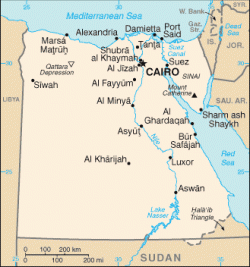Sudan: Colonization

Mary Galanis
World History
Period 2
May 6, 2009
Sudan is a country in the northern part of Africa that borders Egypt. The fight for the republic of Sudan was a battle by mainly two countries, one from Africa and one from Europe. Egypt, the bordering country of Sudan, was one of them. The other country was Great Britain, who happened to colonize many countries besides Sudan (Benjamin 1060). These two countries fought for the territory and made many influences along the way.
The first attempt at colonization came from their bordering country of Egypt. Muhammad Ali demanded that the Turo-Egyptian invade Sudan in 1820 in order to expand their large army (Benjamin 1060). They had private traders selling women and children into slavery as well (Benjamin 1060). The Egyptians also imposed taxes on the free people in Sudan in order to fund the colonization efforts. The peak of their efforts came in the year of 1880 when they had an immense amount of power and control (Benjamin 1060). Near the end of the nineteenth century, the British started to invade Egypt. To calm the British down, the ruler of Egypt, Khedive Ismail, appointed officers from his own country and those from Britain to try to slow down the amount of slaves being traded because of the British policy of antislavery in Europe (Benjamin 1061). The attempt at colonization led Egypt in to deep money troubles which then in turn led to Britain, in the year of 1882, occupying Egypt. During this time, the army of Turo-Egyptian was fighting for their survival in Sudan. A Muslim scholar, Muhammad Ahmad, convinced all of the Muslims in Sudan that he would be the one to fix everything and restore the peace of the country. This rally of the Sudanese people was successful in defeating the Turo-Egyptian armies in many battles in the year of 1891 (Benjamin 1061). At a battle in the city of Khartoum in the year 1885, the people following Ahmad killed the British general Charles Gordon (Benjamin 1061). In 1898, more than ten years after the battle, Europe was looking to colonize various countries in Africa and decided to colonize Sudan after the anger still surrounding the death of the general. This is the transition that led to the colonization of Sudan under the power of the British (Benjamin 1061).
When Britain started to colonize Sudan, they had to find a way to destroy the hopes the French had of taking Sudan. So they launched this joint-ruling relationship with Egypt where they would each colonize Sudan together (Benjamin 1061). However, in 1919, there was a nationalist revolt in Egypt that made the British question the stability of their co-partner. The British decided to replace all the Egyptians with Sudanese workers to keep Sudan strong and avoid any violence that could break out between Egyptians. Egypt wasn’t ready to give up their share of Sudan. Their influence came in the form of poetry, songs and movies in the northern parts of Sudan where the more learned people of the country were living (Benjamin 1062). After WWII, the Anglo-Egyptian Agreement pressed for election of Sudan and allowing them to take a step to independence (Benjamin 1061). “Sudan gained independence on January 1, 1956, barely six months after the start of a civil war that went on to blight the country during most of the late-twentieth-century postcolonial period (Benjamin 1061).” Britain and Egypt shared Sudan while attempting to colonize it.
The colonization of Sudan was mainly an ongoing fight between the British and the people of Egypt. The struggle in the end came out peacefully when they agreed to become partners and not actually name their shared territory a “colony.” One person that experienced this was the powerful leader in Sudan named Muhammad Ahmad, also known as El Mahdi. “Adore God, and hate not each other, but assist each other to do good.” (Sidahmed 1). He said this during one of his speeches. There were many people that suffered during this time of colonization and many people who were sold into slavery. However, today, Sudan is an independent country.
World History
Period 2
May 6, 2009
Sudan is a country in the northern part of Africa that borders Egypt. The fight for the republic of Sudan was a battle by mainly two countries, one from Africa and one from Europe. Egypt, the bordering country of Sudan, was one of them. The other country was Great Britain, who happened to colonize many countries besides Sudan (Benjamin 1060). These two countries fought for the territory and made many influences along the way.
The first attempt at colonization came from their bordering country of Egypt. Muhammad Ali demanded that the Turo-Egyptian invade Sudan in 1820 in order to expand their large army (Benjamin 1060). They had private traders selling women and children into slavery as well (Benjamin 1060). The Egyptians also imposed taxes on the free people in Sudan in order to fund the colonization efforts. The peak of their efforts came in the year of 1880 when they had an immense amount of power and control (Benjamin 1060). Near the end of the nineteenth century, the British started to invade Egypt. To calm the British down, the ruler of Egypt, Khedive Ismail, appointed officers from his own country and those from Britain to try to slow down the amount of slaves being traded because of the British policy of antislavery in Europe (Benjamin 1061). The attempt at colonization led Egypt in to deep money troubles which then in turn led to Britain, in the year of 1882, occupying Egypt. During this time, the army of Turo-Egyptian was fighting for their survival in Sudan. A Muslim scholar, Muhammad Ahmad, convinced all of the Muslims in Sudan that he would be the one to fix everything and restore the peace of the country. This rally of the Sudanese people was successful in defeating the Turo-Egyptian armies in many battles in the year of 1891 (Benjamin 1061). At a battle in the city of Khartoum in the year 1885, the people following Ahmad killed the British general Charles Gordon (Benjamin 1061). In 1898, more than ten years after the battle, Europe was looking to colonize various countries in Africa and decided to colonize Sudan after the anger still surrounding the death of the general. This is the transition that led to the colonization of Sudan under the power of the British (Benjamin 1061).
When Britain started to colonize Sudan, they had to find a way to destroy the hopes the French had of taking Sudan. So they launched this joint-ruling relationship with Egypt where they would each colonize Sudan together (Benjamin 1061). However, in 1919, there was a nationalist revolt in Egypt that made the British question the stability of their co-partner. The British decided to replace all the Egyptians with Sudanese workers to keep Sudan strong and avoid any violence that could break out between Egyptians. Egypt wasn’t ready to give up their share of Sudan. Their influence came in the form of poetry, songs and movies in the northern parts of Sudan where the more learned people of the country were living (Benjamin 1062). After WWII, the Anglo-Egyptian Agreement pressed for election of Sudan and allowing them to take a step to independence (Benjamin 1061). “Sudan gained independence on January 1, 1956, barely six months after the start of a civil war that went on to blight the country during most of the late-twentieth-century postcolonial period (Benjamin 1061).” Britain and Egypt shared Sudan while attempting to colonize it.
The colonization of Sudan was mainly an ongoing fight between the British and the people of Egypt. The struggle in the end came out peacefully when they agreed to become partners and not actually name their shared territory a “colony.” One person that experienced this was the powerful leader in Sudan named Muhammad Ahmad, also known as El Mahdi. “Adore God, and hate not each other, but assist each other to do good.” (Sidahmed 1). He said this during one of his speeches. There were many people that suffered during this time of colonization and many people who were sold into slavery. However, today, Sudan is an independent country.
AP Images
Benjamin, Thomas, ed. "Egyptian and British Rivalry in Sudan." Encyclopedia of Western Colonialism since 1450. 3rd ed. 3 vols. Detroit: Macmillan Reference, 2007. 1060-062.
This was my main source of information because of the detailed account I received from it about the history of the colonization and the roles Great Britain and Europe both played in it.
Encyclopedia - Britannica Online Encyclopedia. 04 May 2009 <http://search.eb.com/eb /article-9070139>.
This website gave me information on the ties Egypt had to Sudan and when and how Sudan became an independent country.
Sidahmed, Abubakr. "El Mahdi." Look Lex Encyclopedia. 4 May 2009.
This website was where I found my information on the leader in Sudan named Muhammad Ahmad. He was very influential and was there during the colonization of his own country.
"Sudan (History) - Crossroads linking Black southern Africa, Mediterranean areas, southern Sahara, Red Sea." 04 May 2009 <http://www.arab.de/arabinfo/sudanhis.htm>.
This website gave me help in finding out the background information about the history of Sudan and what Egypt took when they colonized Sudan.
Last updated by Mary Galanis on May 22, 2009

